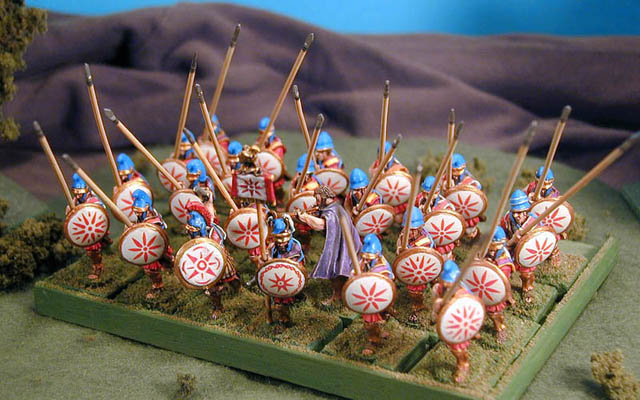
The Origins of Macedonian
Tactics
and the invention of the Phalanx

UNUSUAL DRILL
Alexander knew he was in trouble. His first campaign since assuming the Macedonian crown from his murdered father, Philip II, was going sour. The early victories on this "Balkan excursion" had come by audaciously attacking a dug-in Thracian wagon laager, crossing the Danube and beating a tribe of Getae nomads by ruse and guile, and then luring another mountain tribe, the Triballians, into a trap and an easy victory. His army had marched and fought over some of the hardest terrain in Southern Europe. But his "punitive" campaign to awe the Barbarians and secure his Northern frontier had suddenly stirred the Illyrians, Macedonia’s most dangerous and inveterate border foes, into an alliance that had succeeded in cutting him and his army off from the road home.
Alexander had so far brilliantly wielded the army that his father had engineered and honed to the sharpest edge in twenty years of campaigning. He had established, despite his youth, that he had the ability to lead this army, and with the assistance of his veteran commanders he was as formidable a general as his father. But his decision to force march his army to invest the fortress of Pelium, which had recently been captured by this force of Illyrians under their King Cleitus, was his first major mistake of his brief military career. As he rushed his army onto the plain in front of Pelium, the Illyrians retreated into the fort itself and Alexander prepared to besiege them. Then another tribe, the hard drinking hillmen called the Taulantians (ancestors of modern Albanians) sneaked up and cut off Alexander’s meager forces from reinforcements and supplies by occupying the mountains in their rear.
Alexander’s scouts and forage parties were forced back, and unable to assault the fortress of Pelium to his front or turn his back on them and attack the highlanders to his rear, he was, as his biographer Arrian described, in an "awkward position". Even if he could break out he was faced with a retreat across a river, through a very narrow defile- which was easy ambush territory.
The Taulantians were fairly well placed on the commanding hills with slingers and javelin men covering mounted troops, supported by the warbands of heavy infantry led by their King, Glaucias. After what must have been a rather sleepless night in this predicament… Alexander mustered his men in the middle of the plain between the two hostile forces and began a…..parade.
Arrian described what transpired:
"Alexander drew up the phalanx in column 120 deep, posting on either wing 200
cavalrymen with instructions to make no noise, and to obey orders smartly. Then he gave
the order for the phalangites first to raise their spears, and afterwards, at the word of
command, to lower the massed points for attack, swinging them, again at the word of
command, now to the right, now to the left. The whole phalanx then moved smartly forward,
and, wheeling it this way and that, caused it to execute various intricate movements.
Having thus put his troops with great rapidity through a number of different formations,
he ordered his left to form a wedge and advanced to the attack."
"The enemy , already shaken by the smartness and discipline of these maneuvers, abandoned their position on the lower slopes of the hills without waiting for the Macedonians to come to grips with them."
Alexander then barked out orders for the Phalangites to clash their spears against their shields and raise the war cry- something that must have been similar to the stomping chants in front of Rorke’s Drift in the movie Zulu!
Unable to withstand this "wall of noise and spears", the Taulantians inexplicably left their positions and allowed the Macedonians to slip out of the trap. Later the tribesmen gathered themselves and gave chase, but Alexander, with a rear guard of Companion cavalry and elite Hypaspists, kept them from hindering the retreat across the river. At one point, Alexander brought up his Cretan archers and ordered them to fire from mid stream at the pursuers, then ordered his war machines to fire bolts into the warbands as they packed into the pass in pursuit. The Barbarians melted away from this fire, satisfied that they had achieved victory over the retiring Macedonians. Days later Alexander regrouped and then returned with the elite core of his infantry, the Hypaspists, the Agrianian javelin men, and his Cretan archer mercenaries. The overconfident Illyrians were caught sleeping in their unfortified camp by these "Commandos" and were slaughtered, the remainder scattered, ending all threats from these dangerous tribesmen for many years.
Alexander had used the tools forged by his father well. He had an innate talent at how to use his elite infantry guardsmen (Hypaspists), the superbly drilled phalanx, the maneuverable wedges of heavy Companion Cavalry, and the proper timing of support with archers and skirmishers. Even in his first battles he learned that the combined arms tactics of his highly disciplined and trained army could be unbeatable. Lessons that would one day lead to his conquest of Persia and his shooting star career of unparalleled military fame.
Created by Jeff Jonas 08/99